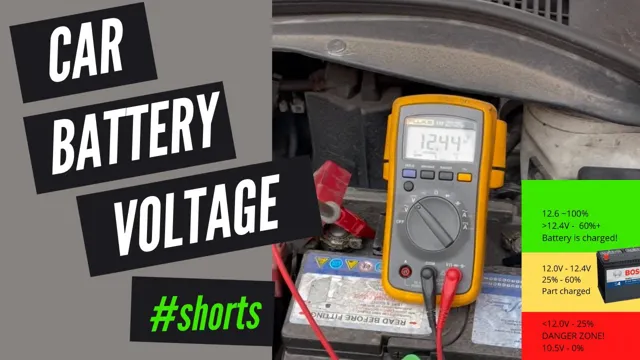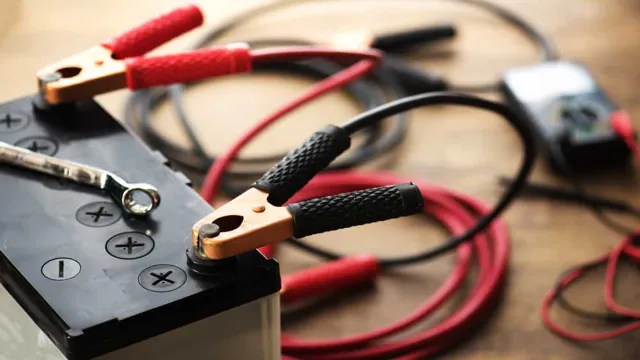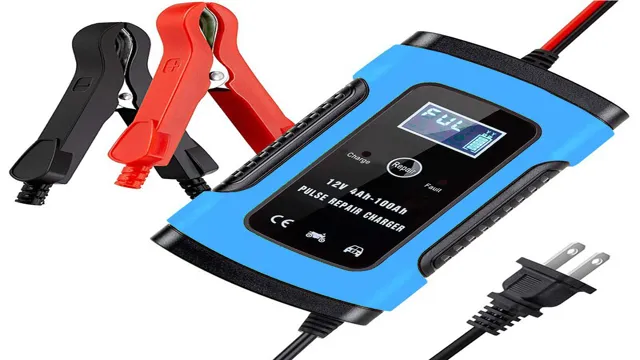How many volts should a car battery charger put out: A comprehensive guide for vehicle owners.

Have you ever been stranded with a dead car battery? It’s a frustrating experience that can ruin your day. To prevent this from happening, it’s important to maintain your car battery with a charger. But what voltage should a car battery charger put out? The voltage output of a car battery charger is a crucial factor in keeping your car battery fully charged and healthy.
When choosing a charger, you need to consider the voltage output to ensure that it’s compatible with your car battery’s needs. In this blog, we’ll explore the ideal voltage output of a car battery charger and how to choose the right one for your vehicle. We’ll also discuss the importance of maintaining your battery’s health and the benefits of using a car battery charger.
So, if you want to keep your car running smoothly, read on!
Understanding Car Battery Chargers
When it comes to understanding car battery chargers, one question that often arises is how many volts should a car battery charger put out. The answer to this inquiry is dependent on the type of battery and charger being used. Generally speaking, a car battery charger should put out around 1
6 to 15 volts. However, if a battery charger has too high of a voltage output, it can cause damage to the battery and even lead to overcharging which can be dangerous.
On the other hand, an insufficient voltage output will not adequately charge the battery. A good rule of thumb is to check the manufacturer’s specifications for both the battery and charger and ensure they are compatible before using them. It’s important to note that using the wrong charger can lead to irreparable damage and shorten the lifespan of the battery.
So, it’s crucial to know how many volts your car battery charger should put out to avoid any potential issues.
The Purpose of a Car Battery Charger
A car battery charger is an essential tool for proper car maintenance. It serves the purpose of recharging the battery when it has been drained. A car battery can be drained due to a wide range of reasons, such as long periods of inactivity, leaving the headlights on, or using too many electronic devices without running the engine.
Having a car battery charger helps to ensure that your car always starts when you need it. Most car battery chargers have advanced features, such as overcharge protection and short-circuit prevention, which ensure that your battery is charged safely and efficiently. Additionally, car battery chargers can help you to diagnose battery problems before they become more severe.
If your car battery is showing signs of weakness, such as slow cranking, it is recommended that you use a car battery charger to recharge it before it completely dies. This can help to extend the life of your battery and save you money in the long run. Overall, a car battery charger is a valuable investment for any car owner who wants to ensure that their car is always ready to go when they need it.

Types of Car Battery Chargers
Car Battery Chargers Car battery chargers come in a variety of shapes and sizes, including trickle, float, and smart chargers. Each type of charger utilizes a unique charging method to keep your car’s battery fully charged and functional. Trickle chargers are best suited for long-term battery maintenance and can be left connected to a battery for extended periods without damaging it.
Float chargers, on the other hand, are designed to provide a continuous charge to a battery to keep it at full capacity. Smart chargers are the most advanced type and are capable of monitoring a battery’s charge level and adjusting the charging rate accordingly. This makes them the best option for fast and efficient charging, as they can charge a battery quickly without damaging it.
Ultimately, the type of charger you choose will depend on your needs and the specific demands of your car’s battery. With the right charger, you can ensure that your car’s battery is always charged and ready to go when you need it.
Optimal Voltage Output
When it comes to charging your car battery, you may be wondering how many volts a car battery charger should put out. The optimal voltage output is typically between 18 and 1
8 volts. This voltage range is the most effective at charging your battery without causing any damage. It’s important to use a charger that is specifically designed for car batteries, as using the wrong type of charger or voltage level can harm your battery and even pose a safety risk.
Keep in mind that the charging time will vary depending on the type and size of your battery, so it’s important to follow the manufacturer’s recommended charging time to ensure your battery is fully charged and ready to go. So, make sure you have the right charger and voltage output for your car battery to keep it running smoothly and avoid any unnecessary issues down the road.
Factors That Determine the Optimal Voltage Output
The optimal voltage output depends on factors such as the type of device or appliance being powered, as well as the purpose for which it is being used. For example, high-powered devices like heavy machinery or industrial equipment may require a higher voltage output to function properly, while low-powered devices like cellphones or laptops require a lower voltage output. Additionally, the voltage output can be determined by the type of power source being used, such as AC or DC power.
Other factors that may come into play include the distance that the power needs to travel and any environmental factors that may impact the flow of electricity. Ultimately, finding the optimal voltage output requires a thorough understanding of the specific needs of the device or appliance, as well as the surrounding circumstances.
How to Check the Voltage Output of a Car Battery Charger
As a car owner, it’s vital to keep your battery charged and in proper working condition. Checking the voltage output of your car battery charger is essential to ensure that your battery is getting the optimal voltage it needs to function correctly. The optimal voltage output for a typical car battery charger is around 12 volts.
Anything below 11 volts means that your battery is not sufficiently charged and may not work properly. On the other hand, anything above 15 volts may cause damage to your battery and reduce its overall lifespan. Getting the right voltage output is crucial to maintain the health of your battery and extend its life.
Therefore, you need to ensure that your charger is providing the correct amount of voltage to your battery. You can use a multimeter to check the voltage output of your car battery charger and adjust it as necessary. By paying attention to the voltage output of your car battery charger, you can ensure that your battery stays in good shape and operates smoothly.
The Consequences of Using the Wrong Voltage Output
Optimal Voltage Output Using the wrong voltage output can lead to several consequences that you may not expect. For instance, it can cause severe damage to electrical devices, reduce their lifespan, or even result in fires and explosions. To avoid these problems, it is crucial to use the optimal voltage output for any electronic device.
Optimal voltage output refers to the ideal level of voltage that a device requires to function properly without causing any harm. It is essential to choose the correct voltage output to ensure that your devices work optimally and safely. Failure to do so may result in uncontrollable risks such as the melting of wires, circuit breakers, and irreversible malfunctions.
In conclusion, always use the right voltage output to prevent irreversible damages.
Conclusion
In conclusion, the answer to how many volts a car battery charger should put out depends on the specific battery and its requirements. It’s not a one-size-fits-all situation. So, if you want to keep your car charged up and ready to go, make sure to do your research and choose a charger that delivers the right voltage for your particular vehicle.
Always remember, too few volts and your battery won’t charge, too many volts and you may fry your battery. Finding that sweet spot is the key to keeping both your car and your wallet happy.”
FAQs
What is the average voltage output of a car battery charger?
The average voltage output of a car battery charger is 12 volts.
Can a car battery charger output too much voltage?
Yes, a car battery charger can output too much voltage, which can damage the battery.
Is it safe to leave a car battery charger connected overnight?
It is generally safe to leave a car battery charger connected overnight, as long as it has a built-in shut-off feature to prevent overcharging.
What is the difference between a trickle charger and a standard car battery charger?
A trickle charger outputs a lower voltage over a longer period of time, while a standard car battery charger outputs a higher voltage over a shorter period of time.
How long does it take to charge a car battery with a charger?
The length of time it takes to charge a car battery with a charger depends on the size of the battery and the output of the charger. Generally, it can take anywhere from a few hours to overnight.
Can I use a car battery charger to charge other types of batteries?
It depends on the type of battery and the charger. Some chargers are designed to work with multiple types of batteries, while others are specific to car batteries only.
How do I know if my car battery charger is working properly?
You can check the voltage output with a multimeter, or look for indicators on the charger that show it is charging the battery. It is also important to monitor the battery and ensure it is holding a charge.







